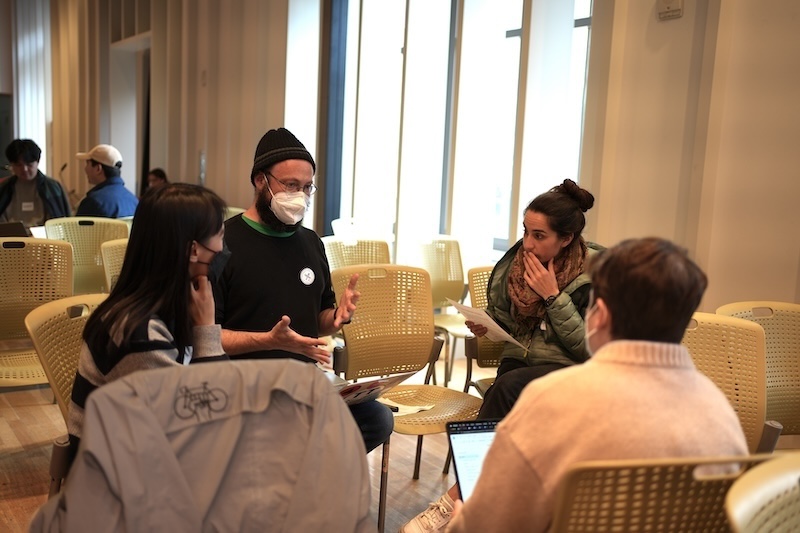AI Labor Council for Healthcare: Exploring Models for Worker-led AI Governance

Increasingly, the U.S. healthcare executives are adopting A.I. technologies in an effort to address rising care costs, poor health outcomes, and labor shortages. However, these A.I. systems may increase the risks of under-diagnosis for marginalized populations; decrease patients’ access to care; and introduce errors or hallucinations into patient records. In theory, A.I. technologies could be supportive for overstretched healthcare workers – for instance via automation notes transcription or by accuracy-checks. But in practice, these technologies have harmful effects on healthcare workers, shifting decision making power away from workers and by justifying rampant under-staffing.
Workers across a wide variety of industries, including education and media, are grappling with similar dynamics around A.I. technologies. Workers who are represented by unions may attempt to negotiate around the terms of these technologies through contract bargaining, as we saw in the Writers Guild of America (WGA) strike and Screen Actors Guild–American Federation of Television and Radio Artists (SAG-AFTRA) in 2023. Much of the contract language won focuses on giving unions the right to bargain over emerging A.I. technologies that impact their work (see, for instance, language won by healthcare workers in Tennessee, and a local with the Financial Times; language by a culinary workers local in Nevada also includes claims to funding for retraining workers displaced by A.I.).
While contract negotiation by unions is a valuable mechanism for responding to the impacts of A.I., not all workers are represented by unions. Additionally, even contract negotiation must be undergirded by forums for collective sensemaking and problem-solving by impacted workers. What mechanisms or spaces can enable real-time, collective evaluation of A.I. technologies as they unfold? In this project, I hope to pilot one possible organizational mechanism for enabling this kind of collective response: a “labor council” for A.I. in healthcare.
A “People’s Council” for AI?
In a 2018 article grappling with the impacts of machine learning systems, computing scholar Dan McQuillan (author of “Resisting AI: An Anti-fascist Approach to Artificial Intelligence”, 2022) suggests the creation of “people’s councils for ethical machine learning”, “as a way to contest machinic judgments and reassert openness and discourse.” McQuillan suggests that, rather than locating the problems of ethics in machine learning within the technology, that what is needed are more democratic and collective spaces for designing and implementing this technology. He describes people’s councils as “bottom-up, confederated structures that act as direct democratic assemblies”, paralleling the core values of worker co-operatives. Building from this idea, perhaps worker’s councils for A.I. can be a vehicle for enabling collective, democratic engagement with emerging A.I. technologies, supporting and extending beyond the current terrain of union contract bargaining.
In order to create a space for collective sensemaking and problem-solving around the risks and harms of emerging A.I. systems, I plan to launch a one-year pilot of an “A.I. Labor Council” for healthcare workers – including technologists, healthcare providers, and medical staff. Through monthly meetings, we will elicit and compare concerns around emerging risks/harms of automated systems within a specific organizational context; ideate possible points of intervention; and develop and scale frameworks and best practices for sensemaking and problem solving by A.I. implementers. Through 5+ years of ethnographic research in the healthcare industry, I have developed significant relationships with care workers across the U.S. I plan to leverage these networks to recruit 10-15 workers – motivated to develop collective responses to A.I. in healthcare – to sit on this council.
This project also builds on my ongoing efforts to develop collective, democratic spaces for university workers and students to evaluate and respond to top-down investments and implementation of AI technologies. To date, our A.I. skeptics collective has developed an “AI Workers Inquiry” for university workers, a tool to facilitate collective discussion about the impacts of AI on university workers’ data practices and possible methods of collective response. This aligns as well with the Data Workers’ Inquiry project hosted by the Distributed AI Research Institute (DAIR), through which 16 data workers from Venezuela, Kenya, Syria, Brazil and Germany conducted a form of participatory action research with their fellow data workers. Designing this kind of structured workers’ inquiry activity, and using it to have conversations with a broad group of workers impacted by A.I., may be a valuable first initiative for an A.I. labor council.
Cultivating Collective Governance in the Digital Economy
Through this project, I hope to have immediate social impact by helping healthcare workers articulate and respond to emerging harms of A.I. in their workplace. Additionally, I hope to explore the potential of the “AI Labor Council” as a generalizable framework for workers to collectively sense make and respond to the impacts of A.I. At the end of the year-long pilot, I will facilitate the creation of a report summarizing the impacts and responses to A.I. explored in our meetings, and reflections about both the usefulness and limitations of the cross-industry labor council as an organizing framework.
The Platform Co-op Consortium’s mission is to support workers through the development of democratically governed and controlled digital technologies. In the context of the platform economy, the platform co-op model represents an alternative framework to the extractivist, shareholder-oriented platform business models. Likewise, the AI labor council framework is intended to enable workers to evaluate the impacts of an emerging technology on their labor, and to collectively imagine a worker-led approach to A.I. design, implementation and governance might look like. In this regard, this project builds on other experiments across the Institute for the Cooperative Digital Economy – projects which seek to use co-operative models to create a more just and equitable healthcare system in Mexico; to address social inequities in AI labor; and to improve conditions for precarious care workers. This project will explore whether the principles of the co-op – including voluntary and open membership, democratic member control, autonomy and independence, and education, training, and information – can help to inform a new model of AI governance that supports workers.
Learn more about the author